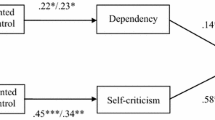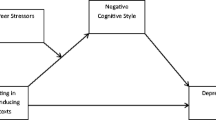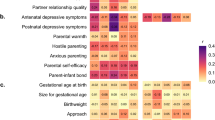Summary
Recent research provides evidence of links between anomalous parenting experiences in childhood and subsequent depression. A study was designed to pursue the possibility that anomalous parenting effects a diathesis to depression by inducing a vulnerable cognitive style rather than by disposing directly to depression. Possible mediating personality style variables were explored in a study of 123 depressed subjects who scored their parents on the Parental Bonding Instrument (PBI), as well as completing a state depression and several relevant personality measures. Low self-esteem and a related dysfunctional cognitive style were the personality variables most clearly linked with PBI scores, with links persisting after partialling out state levels of depression. Failure to find links between PBI scores and depression levels limited explication of the diathesis stress model.
Similar content being viewed by others
References
Abramson LY, Metalsky GI, Alloy LB (1989) Hopelessness depression: a theory-based subtype of depression. Psychol Rev 96: 358–372
Beck AT (1976) Cognitive theory and the emotional disorders. International Universities Press, New York
Beck AT, Ward CH, Mendelson M, Mock J, Erbaugh J (1961) An inventory for measuring depression. Arch Gen Psychiatry 4: 53–63
Becker J (1974) Depression: theory and research, Winston, Washington, DC
Blatt SJ, Homann E (1992) Parent-child interaction in the etiology of dependent and self-critical depression. Clin Psychol Rev 12: 47–91
Blatt SJ, D'Affliti JP, Quinlan DM (1976) Experience of depression in normal young adults. J Abnorm Psychol 85: 383–389
Boyce P, Parker G, Barnett B, Cooney M, Smith F (1991) Personality as a vulnerability factor to depression. Br J Psychiatry 159: 106–114
Eysenck HJ, Eysenck SBG (1964) Manual of the Eysenck Personality Inventory. University of London Press, London
Firth-Cozens J (1992) The role of early family experiences in the perception of organizational stress: fusing clinical and organizational perspectives. J Occup Org Psychol 65: 61–75
Hirschfeld RMA, Klerman GL, Lavori P, Keller MB, Griffith P, Coryell W (1989) Premorbid personality assessments of first onset major depression. Arch Gen Psychiatry 46: 345–350
Hyrenko I, Minto ML (1974) Internal-external control, power position, and satisfaction in task-orientated groups. J Pers Soc Psychol 30: 871–878
Kendell RE, DiScipio WJ (1968) Eysenck Personality Inventory scores of patients with depressive illness. Br J Psychiatry 114: 767–770
McCranie EW, Bass JD (1984) Childhood family antecendents of dependency and self-criticism: implications for depression. J Abnorm Psychol 93: 3–8
Neale MC, Walters E, Heath AC, Kessler RC, Perusse D, Eaves LJ, Kendler KS (1993) Depression and parental bonding: cause, consequence, or genetic covariance? Gen Epidemiol (in press)
Parker G (1983) Parental overprotection. A risk factor in psychosocial development. Grune and Stratton, New York
Parker G (1992) Early invironment. In: Paykel ES (ed) Handbook of affective disorders, 2nd edn. Churchill Livingstone, London
Parker G, Blignault I (1985) Psychosocial predictors of outcome in subjects with untreated depressive disorder. J Affective Disord 8: 73–81
Parker G, Barrett EA, Hickie IB (1992) From nurture to network: examining links between perceptions of parenting received in childhood and social bonds and adulthood. Am J Psychiatry 149: 877–885
Parker G, Tupling H, Brown LB (1979) A parental bonding instrument. Br J Med Psychol 52: 1–10
Parker G, Holmes S, Manicavasagar V (1986) Depression in general practice attenders: “caseness”, natural history and predietors of outcome. J Affective Disord 10: 27–35
Perris C, Jacobson L, Lindsrom H, Von Knorring L, Perris H (1980) Development of a new inventory for assessing memories of parental rearing behaviour. Acta Psychiatr Scand 1: 265–274
Perris C, Arrindell WA, Perris H, Eisemann J, Van Der Ende J, Von Knorring L (1986) Perceived depriving parental rearing and depression. Br J Psychiatry 148: 170–175
Rosenberg M (1965) Society and the adolescent self-image. Princeton University Press, Princeton NJ
Rush AJ (1982) Short-term psychotherapies for depression. Wiley, Chichester
Weissman AN (1979) The Dysfunctional Attitudes Scale—a validation study. Doctoral dissertation, University of Pennsylvania. (Dissertation International, 1979, 40, 1389B–1390B. University Microfilm no 79-19533)
Whisman MA, Kwon P (1992) Parental representations, cognitive distortions, and mild depression. Cog Ther Research 16: 557–568
Zung WWK (1964) A self-rating depression scale. Arch Gen Psychiatry 12: 63–70
Author information
Authors and Affiliations
Rights and permissions
About this article
Cite this article
Parker, G. Parental rearing style: examining for links with personality vulnerability factors for depression. Soc Psychiatry Psychiatr Epidemiol 28, 97–100 (1993). https://doi.org/10.1007/BF00801738
Accepted:
Issue Date:
DOI: https://doi.org/10.1007/BF00801738




